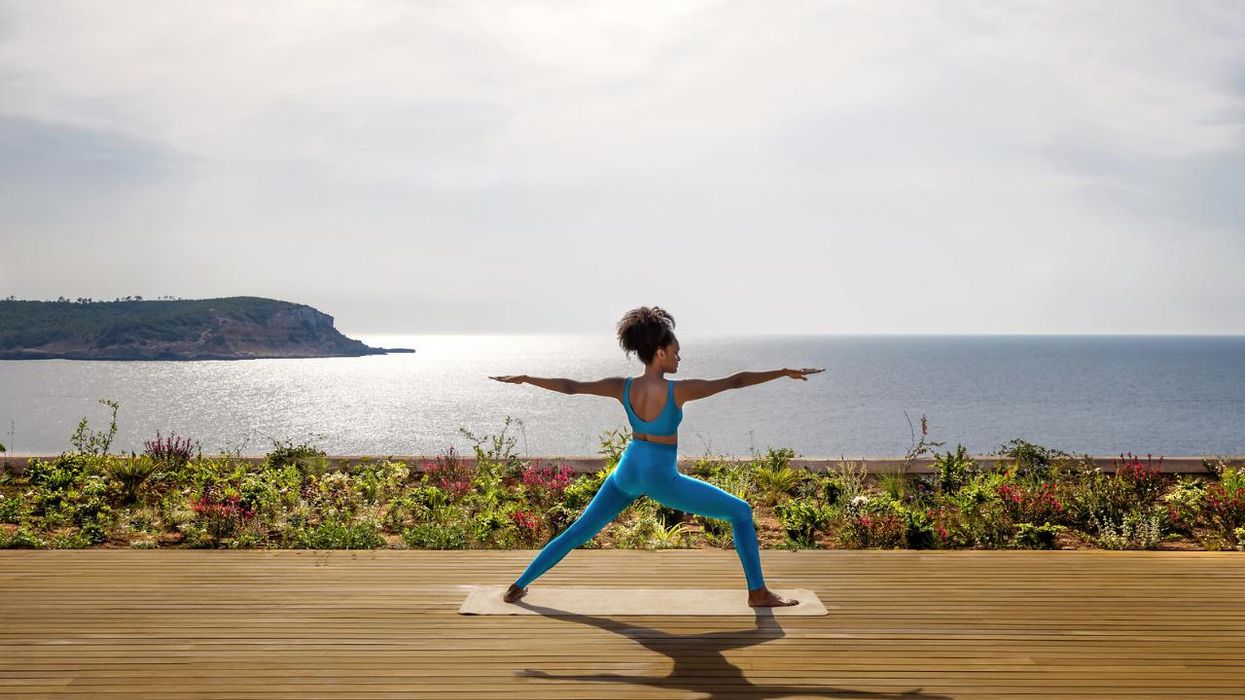We Tried It: I Took a Blood Test to See How Fast I’m Aging
The results were a major wake up call.

I joke with my friends that my diet was similar to that of a 12-year-old boy. I used to get a pack of Oreos from the bodega across the street from my old apartment every single day; and Levain cookies and Milk Bar truffle cake slices were a common delivery food. There was even a time where the first thing in my mouth the moment I woke up were Sour Patch Kids (Watermelon, of course). Because I was fairly thin and fit, I was under the mindset that I could eat whatever I wanted; that, however, wasn't the case and it took a trip to Ibiza, a blood test, and a consultation with Dr. Tamsin Lewis to sound the alarm.
Six Senses Ibiza, a wellness resort on the island, offers a Real Age blood test through Rose Bar, a program that pairs "diagnostics with nutritional guidance and modern healing methods." Through these biological measurements, they're able to make an approximation on how fast you're aging (more on that later).
I'm 26 years old and my "real age" is 27.5 years old. But the number alone doesn't tell the entire story. "We need to prioritize some self-care," says Dr. Lewis over our Zoom call, "because for someone that's as iron deficient and anemic as you are, I'm really surprised that you're functioning." It isn't uncommon for women to be anemic because of our monthly menstrual cycle, but the levels aren't usually as low as mine.
When you have anemia, it means that you have low levels of healthy red blood cells; red blood cells carry oxygen to the body's tissues. The range you want to be in when it comes to the number of healthy blood cells is anywhere from 12 g/dL to 15.6 g/dL; right now, I'm at 9 g/dL.
According to Dr. Lewis, my low levels of iron and healthy red blood cells help to explain my sugar cravings. "When you're working long hours, you're looking for energy," she says. "Your system isn't delivering energy because you're running on a car that's completely empty. So, you turn to these simple sugars and carbs for an energy boost, but it doesn't last. You end up crashing and the cycle continues."
Because she considered this my number one limiting factor, Dr. Lewis prescribed me a few solutions to improve my health and boost my iron levels, and put me in touch with a nutritionist to help get my diet together. "It doesn't have to be all or nothing; small things can make a big difference," she says. "Your body can put up with a lot in your 20s, but as you get older, you could start to see more serious health issues, like osteoporosis."


How Does the Real Age Blood Test Work?
Okay, so let's back up. How can a blood test give someone their "real age" and what does that even mean? Well, it all goes back to your DNA. Your genes and your genome don't change, but the way they're read does.
Each gene has an epigenetic tag; they attach to the gene and can either turn on a gene or block it from being activated. It's basically a light switch for your genes, turning them on or off.
Your epigenetic patterns change based on what you eat—how much you sleep or exercise can cause the light switch to flip on certain genes. This can prevent your genes from staying regulated, and influence your risk of developing chronic conditions.
So, to discover your "real age," the medical professionals at Six Senses Ibiza use various biomarkers, including the blood test, to look at the tags on specific genes that are associated with lifestyle and increased disease risk, and compare them to what's typical for someone your age, says Dr. Lewis. Basically, it looks at if you're aging more quickly or slowly than the average person, why, and what lifestyle changes you can incorporate to slow down the pace. For me, Dr. Lewis's recommendations included specific supplements customized to my needs, a nutrition plan focused on whole foods, more time spent outdoors in the sun (my vitamin D levels were also lower than someone of my age and skin tone), and adequate sleep.
Six Senses Approach to Wellness
At Six Senses Ibiza, the focus is on personalized wellness, sleep health, mindful eating, and self-discovery. The resort's architect and developer, Jonathan Leitersdorf, distills this into a simple quote: "A perfect day consists of 12 hours to connect with yourself and 12 hours spent with the rest of the world." In order to make sure you have the energy to deal with the demands of your job, your friends, and day-to-day stressors, you have to make sure that you have 12 hours for yourself. Those 12 hours break down into three main things: sleep, moving your body, and relaxation.
According to Leitersdorf and his team of wellness practitioners and medical professionals, everyday, you want to try and aim for about 90 minutes of movement (this can be anything from yoga to a HIIT class), 90 minutes of relaxation (this depends on the individual—for me, it'd be reading a book; for others, it could be going on a solo hike), and, ideally, the rest of the 12 hours would be put towards sleep.



When it comes to the mindful eating aspect of the philosophy, the resort's food offerings are based on the diets of the five "blue zones" (the areas of the world where people live the longest.) The menus across the restaurants are primarily plant and fish-based with smoothies, juices, and Mediterranean salads created from vegetables grown in the hotel's garden. Six Senses Ibiza is all about balance, though. Alcohol isn't off-limits and the restaurants do serve delicious dessert options.
For people who are interested in a more focused resort experience, Six Senses Ibiza has a "cool season," from November to April, where the focus is on immersive retreats focused on community and led by wellness practitioners. If that's not your vibe, there's also "hot season," which is centered around enjoying the sun, full moon dinners, and pop-up events.
It's easy to maintain a sense of wellness and balance when you're at a resort that's dedicated to it. While at the resort, I spent my days testing out treatments like IV infusions, participating in activities like rooftop yoga, and swimming in the ocean, and my meals consisted of fresh, whole foods.
The Final Word
While Six Senses does equip you with the information you need to take better control over your life, it's a lot more difficult to prioritize your health when you're thrown back into the drudgery of your daily routine.
But the results from the Real Age blood test made it clear to me that I shouldn't continue to push my health to the side. Before the results of this blood test, I'd had one done with my doctor in New York City. He also confirmed that my red blood cell count was very low, and that I should come in for a follow up. But the thing about anemia is that it makes you extremely exhausted. I simply couldn't muster up the energy to get out of bed, before work, to make it to my appointment. After two rescheduled appointments, I just ended up cancelling it altogether.
The advice gleaned from the Real Age blood test were things that I technically already knew: that I should eat better, exercise more, get more sleep, and prioritize activities that make me happy. But still, sometimes it takes a wakeup call in the form of a test result as the motivation you need to actually change your habits. I've started taking supplements recommended by Dr. Lewis and I'm trying (emphasis on trying) to cut down on my sugar intake. It's still definitely a work in progress, and even if I haven't done a complete overhaul when it comes to my lifestyle, I've already noticed the small shifts have started to make a big difference.
Photos: Courtesy of Six Senses Ibiza
Want more stories like this?
Are Infrared Saunas Worth the Hype?
It's Time to Book a Wellness Retreat in Santa Fe
Qigong Might be the Wellness Secret You Never Knew You Needed




